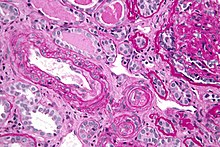
Back متلازمة أضداد الفوسفوليبيد Arabic Síndrome antifosfolipídica Catalan Antiphospholipid-Syndrom German Síndrome antifosfolípido Spanish نشانگان آنتی فسفولیپید Persian Syndrome des antiphospholipides French תסמונת אנטי-פוספוליפידית HE Հակաֆոսֆոլիպիդային համախտանիշ Armenian Sindrom antibodi antifosfolipid ID Sindrome da anticorpi antifosfolipidi Italian
| Antiphospholipid syndrome | |
|---|---|
| Other names | Hughes syndrome,[1] aCL syndrome, anticardiolipin antibody syndrome, antiphospholipid syndrome, lupus anticoagulant syndrome[2] |
 | |
| Micrograph showing an advanced thrombotic microangiopathy, as may be seen in APLA syndrome. Kidney biopsy. PAS stain. | |
| Specialty | Immunology, hematology, rheumatology |
Antiphospholipid syndrome, or antiphospholipid antibody syndrome (APS or APLS), is an autoimmune, hypercoagulable state caused by antiphospholipid antibodies. APS can lead to blood clots (thrombosis) in both arteries and veins, pregnancy-related complications, and other symptoms like low platelets, kidney disease, heart disease, and rash. Although the exact etiology of APS is still not clear, genetics is believed to play a key role in the development of the disease.[3]
Diagnosis is made based on symptoms and testing, but sometimes research criteria are used to aid in diagnosis. The research criteria for definite APS requires one clinical event (i.e. thrombosis or pregnancy complication) and two positive blood test results spaced at least three months apart that detect lupus anticoagulant, anti-apolipoprotein antibodies, and/or anti-cardiolipin antibodies.[4]
Antiphospholipid syndrome can be primary or secondary.
• Primary antiphospholipid syndrome occurs in the absence of any other related disease.
• Secondary antiphospholipid syndrome occurs with other autoimmune diseases, such as systemic lupus erythematosus.
In rare cases, APS leads to rapid organ failure due to generalised thrombosis; this is termed "catastrophic antiphospholipid syndrome" (CAPS or Asherson syndrome) and is associated with a high risk of death.
Antiphospholipid syndrome often requires treatment with anticoagulant medication to reduce the risk of further episodes of thrombosis and improve the prognosis of pregnancy. The anticoagulant medication used for treatment may differ depending on the circumstance, such as pregnancy.
- ^ Hughes G, Khamashta MA (2013-07-01). Hughes Syndrome: Highways and Byways. Springer Science & Business Media. ISBN 9781447151616. Archived from the original on 2017-03-31.
- ^ "Antiphospholipid syndrome". Autoimmune Registry Inc. Retrieved 14 June 2022.
- ^ Islam, Md Asiful (2018). "Genetic risk factors in thrombotic primary antiphospholipid syndrome: A systematic review with bioinformatic analyses". Autoimmunity Reviews. 17 (3): 226–243. doi:10.1016/j.autrev.2017.10.014. PMID 29355608 – via Science Direct.
- ^ Cite error: The named reference
Barbhaiya-2023was invoked but never defined (see the help page).